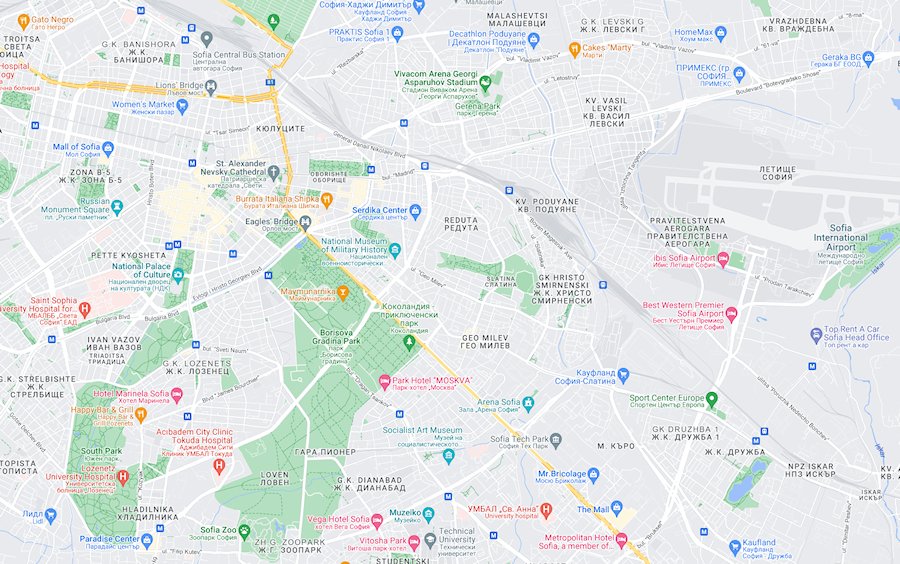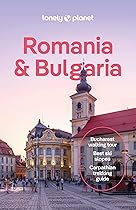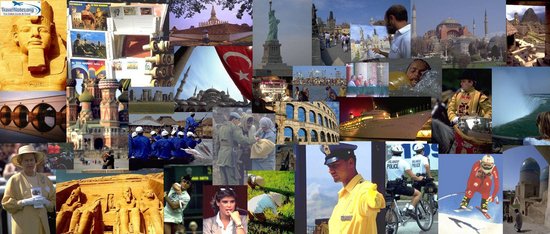Travel Notes: Europe - Bulgaria Travel Notes.
Short URL: https://tnot.es/BG
Bulgaria Travel and Tourism on Travel Notes
Plan a Bulgarian Adventure - Unforgettable Experiences Await
From the majestic Rila Mountains to the picturesque Black Sea coast, Bulgaria's breathtaking natural landscapes offer unforgettable outdoor adventures. Share on Facebook
About Bulgaria
Bulgaria is a beautiful country located in south-eastern Europe known for its stunning mountain ranges, golden beaches, and vibrant cities.
If you're interested in visiting Bulgaria, there are plenty of attractions and activities to enjoy, from exploring the museums and historical sites in Sofia, the capital city, to hiking in the stunning Pirin Mountains.
Countries neighbouring Bulgaria: Greece, North Macedonia, Serbia, Romania and Turkey.
Driving Distances in Europe
 Add a Business -
Add a Location -
Add a Lodging - Add Travel Content
- Add URL
- Travel Services.
Add a Business -
Add a Location -
Add a Lodging - Add Travel Content
- Add URL
- Travel Services.
Mapping Bulgaria
Map of Bulgaria
Bulgaria is bordered by Romania to the north, Serbia and North Macedonia to the west, Greece and Turkey to the south, and the Black Sea to the east.
Bulgaria's capital and largest city is Sofia.
Bulgaria Overview
Bulgaria is a country located in South-east Europe.
Economy
The economy of Bulgaria is largely based on services, particularly tourism, as well as industry, agriculture, and energy.
The country has made significant progress in recent years in reducing poverty and increasing economic growth, although it still faces challenges such as corruption and emigration of its workforce.
Bulgaria will officially introduce the Euro on January 1st, 2026, although the Bulgarian lev will continue in dual circulation for one month. Prices will be shown in both currencies initially.
European Union and NATO
Bulgaria is a member of the European Union and NATO, and has a population of around 7 million people.
Landscape
Bulgaria has a diverse landscape, including mountains, forests, rivers, and beaches on the Black Sea coast.
Language
The official language is Bulgarian, which is a Slavic language written in the Cyrillic alphabet.
Traditional Heritage
Bulgaria is also known for its rich cultural heritage, including ancient Thracian artifacts, medieval monasteries, and traditional folk music and dance.
Brief History of Bulgaria
The history of Bulgaria dates back to the ancient Thracians, who were later conquered by the Romans and then the Byzantine Empire.
Over the centuries, Bulgaria was ruled by various empires, including the Ottoman Empire and the Soviet Union, before becoming a democratic republic in 1990.
Ancient Thracians
The Thracians had developed their civilisation Before Christ, and were joined by the Slavs towards the end of the 5th century.
The Bulgarian state was founded as a unification of Slavs, Thracians and Bulgars in 681 AD, and its first ruler was Khan Asparuh.
Bulgars
The Bulgars came down from the steppes of Central Asia and crossed the Danube in the mid-7th century.
First Bulgarian Empire
This First Bulgarian Empire lasted until 1018, when it fell to the Byzantines.
Second Bulgarian Kingdom
The Second Bulgarian Kingdom was established in 1185, and Bulgaria entered a Golden Age; in which the kingdom touched three seas.
Ottoman Turks
The Ottoman Turks put a stop to that for almost 500 years, and subjugated the Bulgarians to Islamic rulers.
Sofia became the capital of Bulgaria in 1879, after liberation from the Turks.
Balkan Wars
Two Balkan wars followed, and then the Bulgarians lost twice on the side of Germany in the World Wars too.
Communist Party
Georgi Dimitrov took power for the Communist party in 1945, and proclaimed Bulgaria a People's Republic.
Bulgaria finally declared itself a democracy in 1989, when Todor Zhivkov was peacefully ousted following the lead of other East European states.
European Union
On January 1st, 2007 Bulgaria joined the European Union.
Visiting Bulgaria
Bulgaria is a beautiful country with a rich history and culture.
Once the cradle of Slav culture the Cyrillic alphabet was created in Bulgaria by the brothers Cyril and Methodious.
Budget Travel in Bulgaria:
Lustrous in the springtime and awesome in the summer, Bulgaria is one of the last
remaining budget destinations in Europe.
Forget about the expensive, crowded beaches and ski resorts in France and Italy and discover the Beauty of Bulgaria.
Things to See and Do in Bulgaria
Bansko
Ski or snowboard in Bansko, a popular winter resort in the Pirin Mountains.
The town also has a charming historic center with traditional architecture and lively nightlife.
Black Sea Coast
Visit the Black Sea Coast and enjoy the sandy beaches, clear waters, and warm climate.
There are many seaside resorts to choose from, such as Sunny Beach and Golden Sands.
Bulgarian Cuisine
Indulge in traditional Bulgarian cuisine, which is a delicious blend of Mediterranean and Balkan flavors.
Try dishes like banitsa (a pastry filled with cheese), kavarma (a meat stew), and tarator (a cold soup made with yogurt, cucumbers, and dill).
Bulgarian Monasteries
The building of monasteries in Bulgaria started as early as the 4th - 5th century.
From the very start, monasteries gained great importance as centres of Bulgarian literature and culture and have preserved the nation's treasures during difficult times.
In the last few years, Bulgarian monasteries, which are closely connected to the historical fate of the Bulgarian state and nation, have witnessed increasing tourist interest.
Plovdiv
Explore the ancient city of Plovdiv, one of the oldest continuously inhabited cities in Europe.
Visit the Roman amphitheater, the Ancient Theater, and the Old Town with its picturesque cobblestone streets.
Rila Monastery
Take a trip to the Rila Monastery, one of Bulgaria's most famous landmarks and a UNESCO World Heritage Site.
The monastery, located in the Rila Mountains, is a stunning example of Bulgarian Renaissance architecture.
Sofia
Visit the capital city of Bulgaria, Sofia, and explore its many historical and cultural landmarks, such as the Alexander Nevsky Cathedral, the National Palace of Culture, and the Museum of Socialist Art.
Veliko Tarnovo
Visit Veliko Tarnovo, the former capital of the Second Bulgarian Empire.
Explore the Tsarevets Fortress, the Samovodska Charshia, and the numerous museums and galleries in this beautiful city.
Sofia
Map of Sofia
Bulgaria by Air
Flights to Sofia - SOF
Airlines and Airports - Cheap Flight Tickets.
Sofia Sightseeing
The main points of interest in Sofia are: Alexander Nevski Memorial Church, Rotunda of St. George, St. Sofia Church, National Palace of Culture, Church of St. Nedelya, Vassil Levski Monument, Sofia University, the Russian Church and Mount Vitosha.
Outside Sofia, visit the Boyana Church and Dragalevtsi Monastery.
Where to Stay in Sofia
Around Bulgaria
At 1350m, Borovets was once the hunting estate of Bulgarian Kings. Today it is a fine place to ski in the winter, and only 73 km from Sofia.
If you're looking for a great-value Mediterranean-style holiday on perfect golden sand beaches with beautiful, clear seas and a sunny, seasonable climate from May through October, consider the Bulgarian Coast, on the Black Sea.
Chiflik
Starting point for hikers visiting the mountain trails, Chiflik also has a mineral spring.
The mineral water, with a temperature of 50 degrees, fills a large open-air swimming pool and some smaller ones in the neighbourhood.
Rural
Bulgaria - Kostenets:
Village Kostenets is one of the most idyllic and relaxing places in Bulgaria.
Varna
Varna is Bulgaria's number one resort on the Black Sea, with a wonderful beach and cosy cafes.
Varna Black Sea coast offers a combination of marvellous conditions for sea tourism, rich cultural heritage and incredible nature. The sea capital of Varna gives opportunities for pleasant recreation at seaside, entertainment and cultural tourism.
To the north of Varna are located some of the most beautiful and luxurious Bulgarian sea resorts, such as 'St. St. Konstantin and Elena', 'Sunny day', 'Riviera', 'Golden sands', 'Albena', which offer excellent conditions for wonderful summer vacations, entertainment and water sports.
Bulgaria Attractions
Bulgaria Maps and Travel Guides
Bulgaria Travel Guides - Bulgaria Maps.
Weather in Europe:
Local weather forecasts for destinations around Europe.
|
|
More From Travel Notes
Travel Notes Online Guide to Travel
Africa - Asia - Caribbean - Europe - Middle East - North America - Oceania - South America.
The Travel Notes Online Guide to Travel helps visitors plan their trip with country and city travel guides, local tourist information, reviewed web sites, and inspiring travel content.
Travel and Tourism Guides on Travel Notes
 If you find Travel Notes useful, please take a moment to
like us on Facebook and share with your friends on social media.
If you find Travel Notes useful, please take a moment to
like us on Facebook and share with your friends on social media.
Share on Facebook
Travel Resources
.
Travel & Tourism With Industry Professionals.














